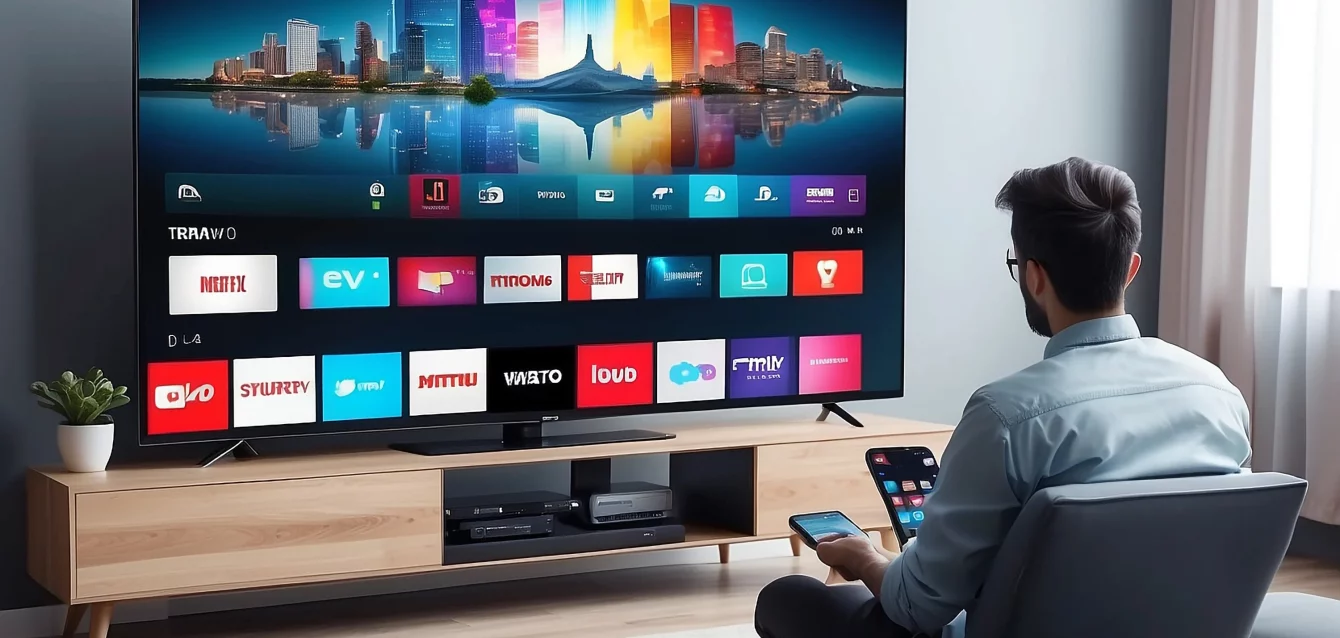Quick Summary: Connected TV (CTV) advertising brings an ability to deliver targeted video advertising to internet-connected TV devices and streaming platforms – offering the scale of television advertising and the targeting, personalization, and measurement of digital advertising.
Reading Time: 20 minutes | UPDATED: July 2025
What Exactly is Connected TV (CTV) Advertising?
Short Answer: Connected TV advertising is a method of placing video ads in front of viewers who are watching television on a connected device, such as a streaming device or smart TV, allowing for granular targeting and digital-style measurement of IP-delivered television advertising.
Fundamental components of CTV Advertising:
Devices connected to the internet, smart TVs, gaming consoles, and streaming players
What we are viewing on demand and live video services is are Household and demographic-level targeting ability
Programmatic Buying: Automatic buying and optimization
Online Metrics: Advanced attribution and analysis tools
Linear TV, OTT, and CTV: Examining the Ecosystem
Specifying terminology and distinctions helps marketing plans to be most successful in the TV and streaming arena.
Aspect | Television connected (CTV) | OTT (over-the-top) | Linear or traditional television |
Definition | Devices for Internet-connected television | Content delivery over the web | Traditional broadcast television |
Delivery Method | TV’s internet connection | over internet streaming | broadcasting, cable, satellite |
Targeting Capability | Addresses at the household level | User-level targeting | Demographic estimation |
Measurement | Digital measurements and television reach | Digital analytics | Panel-based valuations |
Inventory Categories | Streaming apps on TV devices | All streaming content | Scheduled TV programming |
Ad Encounter | TV screen, lean-back viewing | Several screens, flexible | Appointment viewing, TV screen |
Aspect | Television connected (CTV) | OTT (over-the-top) | Linear or traditional television |
Definition | Devices for Internet-connected television | Content delivery over the web | Traditional broadcast television |
Types of CTV devices
Smart TVS:
Native internet connection and streaming programs provide built-in connectivity.
Roku TV, Android TV, LG webOS, Samsung Tizen Operating Systems
Market Share: biggest and fastest-growing CTV category
Targeting: household and device-level targeting features.
Streaming Devices:
Leading streaming service with a large ad inventory: Roku
Amazon Fire TV is incorporated into the Amazon ecosystem and retail.
Apple TV: Premium audience with sparse advertising capacity
Google’s streaming device with YouTube integration is called Chromecast.
Gaming Devices
PlayStation: Entertainment streaming and gaming abilities
Microsoft’s gaming and media channel is Xbox.
Gaming-oriented Nintendo Switch with streaming app support
Target audience: youngsters with strong engagement
CTV Advertising Platforms and Inventory
Knowing the CTV advertising environment allows one to find the best targeted possibilities and sources of inventory.
Key CTV Advertising Platforms Streaming service platforms Netflix (Tier of Ads)
Launch: November 2022 ad-supported level
Inventory: Premium original programming and licensed shows
Aiming: geographic, demographic, and content-based
Formats: Video commercials pre-roll, mid-roll.
Live TV Streaming Services
YouTube TV
Service: DVR capabilities, live TV streaming
Integration: the Google ad ecosystem
Targeting: Google’s sophisticated audience targeting
Measurement: comprehensive attribution and measurement
Hulu + Live TV
Blend: Live television and on-demand content
Advertising: Disney Advertising platform integration
Audience: Cord-cutters seeking a complete TV replacement
Formats: Live and on-demand formats for advertising
Connected TV Ads Frequently Asked Questions
For CTV advertising, how much is the minimum you must spend?
CTV ad spend is also platform- and goal-dependent. While direct purchase of platforms is a minimum of $50,000 or more monthly, programmatic CTV can range from $10,000 to $25,000 monthly. While entry points might be lower on FAST platforms, premium streaming services could be in the higher range.
How is CTV targeting different from TV targeting?
Panel measurement and demographic targeting is the lifeblood of legacy TV. By contrast, CTV leverages addressable targeting at the household level, utilizing real viewing habits and demographic data. CTV delivers more accurate targeting due to its better measurement and attribution solutions.
Can I use my video ad creative for CTV on digital?
We then leverage TV-specific optimizations, including longer ad lengths (15–30s), more lean-back consumer behaviour, living room placement, and TV-quality production values — even if you’re using the same creative. You can test multiple iterations of your digital video creative for CTV.
How can I measure the performance of my CTV ads?
CTV metrics reflect former standards (reach, frequency, completion rates) as well as newer ones (site visitors, conversions, attribution). Measure branded impact of awareness, consideration, and conversion through pixel tracking, survey research, and attribution analysis.
Targeting Strategies for CTV Audiences
The mix of traditional TV reach and digital targeting precision that went into the development of CTV advertising defines its potential for audience engagement.
CTV Targeting Capabilities Targeting Demographic and Geographic Demographics of the Household:
Age and Gender: The dominant viewer characteristics and family composition
Income Level: Domestic income and purchase power groupings
Life Stage: Young professionals, families with kids, empty nesters
Education: Work and scholarly success
Geographic Accuracy:
Then there is DMA (Designated Market Area) concentration.
Focusing on the local and ZIP code levels
Geographic boundaries tailored personally
Categories of life in rural, suburban, and urban communities
Targeting of Interests and Behaviour Viewing behaviour:
Preferred contents are genre, show format, and viewing patterns.
Days of Week: When people are watching, by day of week. Peak Times: When people are watching, by time of day
Bingeing: How long people binge, and what they binge on
Device Usage: Streaming device vs smart TV
Categories of Interests:
Hobbies and lifestyle preferences
Brand preferences and shopping habits
Travel and entertainment tastes
Interests in wellness and health
Advanced Crowd Segmentation Integration of First-Party Data:
Customer Lists: CRM Data Matching for recent or current customers
Website Visitors: focused based online of interest
Mobile app consumers: Usage and engagement metrics
History – What they have bought and how they have bought it
Lookalike Audiences:
Like other families, top customers
Expanding depending on viewing behaviour
Cross-platform behavioural similarity
Buy tendency modelling
Contextual Targeting
Targeting Based on Content:
Target Genres: News programming, Comedy, sports, drama
Show-Level Targeting: Some Shows and Programs
Daypart: prime time, late night, weekend PROGRAMMING
Live versus On-Demand: Level of control and type of context viewed
Events and Seasonal Targeting:
Holiday and seasonal programming correspondence
Sports events and unique programming
Background in the news and current events
Social and cultural events
Creative Variables and CTV Advertising Formats
The formats for CTV ads land somewhere between the experience of watching regular TV and the creative options of digital advertising.
Types of CTV Ad Formats Standard Video Advertising Forms Pre-Roll Ads
Placement: Before any material starts Average length: 15–30 seconds
Skippability: Usually non-skippable
Pros: High completion rates and strong attention span parties
Mid-Roll Advertisements
Place this: Between natural material.
Time: 15-30 seconds; sometimes 60+ for premium material.
Experience: Commercial break feel type of experience similar to when you watch TV
Performance: Content is a way to get results with strong completion rates.
Post-Roll Advertisements
Location: After finishing the content
Length: 15–30 seconds
Completion: Reduced completion rates
Use Case: Promoting next episode, brand messaging
Interactive Ad Types Clickable Video Advertisements
Interaction: Devices that can be clicked using the remote control
Features: Read more, App downloads, web visits
Experience: [perfect switch over something will be better]
Measure: Following up on engagement and click-through rates
Shoppable Television Ads
Direct purchase opportunities: Commerce Integration
Product Details: availability, cost, specifications
Buy Flow: Simplified checkout procedure
Credit: Sales directly to TV commercials
Pause Screen Ads
Start: Show ads when content is paused
Type: animated/stationary ad displays
Pro: Good visibility that doesn’t block content.
Platform: Stream on specific streaming services. An Acropolis stock-market raider introduces his naive son to vice in the fleshpots of Athens.
Branded and Sponsorship content Content Sponsorship:
Integration: Linking a brand with a particular material
Placement: Opening and ending credits, cards with the brand name
Value: Brand affiliation with elite content
Measurements: studies on association and brand lift
Personalized Brand Content
Creation: Co-created or brand-created material
Allocation: Placement of platform-specific content
Native platform audience participation
Performance: Measures of content completion and involvement
CTV Creative Standard Operating Procedures Creative Design for Television
Lean-Back Experience: Design for a casual, at-home audience
Television-quality production: High production values fit top-notch content.
Sound Design: Adjust for sound systems and TV speakers.
Brand prominence: Early, obvious brand recognition
Interest and Involvement
Great Opening: Grab the audience’s attention in 3–5 seconds
CTA and short value proposition Clear Messaging
Emotional Hook: Appropriate TV Storytelling in TV Context
The optimization exists to maintain the ad period.
Technical Details
Quality: HD / 4K QUALITY for optimum viewing consideration
Aspect ratio: 16:9 landscape format for TV screens.
File Formats: technical data on particular systems
So I have Subtitles: board decision and ADA compliance
CTV Campaigns Purchase and Optimization
Success with CTV advertising requires new planning and optimization tactics that are specific to the TV advertising environment.
CTV Acquisition Strategies Purchase of programmatic CTV
Procedure: Demand-side platforms (DSPs) buy items automatically.
Advantages:
Targeting and improvement of the audience-first kind
Real-time bidding and budget optimization
Controlling cross-platform campaigns
Attribution as well as a thorough performance review
Factors:
Platform fees and technology expenditures
Brand safety and inventory quality
Measurement and attribution arrangement
Specifications for technical and creative work
Direct Platform Buying
Process: Use streaming services to directly insert orders.
Advantages:
Better assurances and stock availability
Choosing targets depending on the platforms
Making use of first-party platform data
Individualized ideas for sponsors and creatives
Requirements:
Rising minimum spending obligations
Creative needs particular to some systems
Uncomplicated handling of relationships
Platform statistics and reporting
Private Marketplace (PMP) deals
Structure: Invitation-only programmatic auctions
Advantages:
Well inventoried, good quality and bought down levels
Brand safety and quality control
Preferred access to popular content
Customized targeting and measurement
Set up:
Volume commitments and negotiated prices
Custom terms and conditions of the transaction
Service-level account management
Performance guarantees and optimization
CTV Campaign Optimization Strategies
Audience Optimization:
Refining Targets:
Performance-Based Clusters: Find out audience-based clusters with Maximum performance.
Scale the same traits audience built the right way with lookalike expansion.
Frequency capping: Optimize the right frequency and reach patterns to watch TV.
Cross-device link: Connect behaviour between devices, linked to CTV exposure.
Creative Performance Optimization
Creative Testing:
A/B Test the Messaging: Attractive words like A lot of offers, lots of value, etc.
Also test 15s, 30s, or longer formats to get time under control.
Rotate Multiple Creative Variations.
Adapt platforms: Adapt the platforms you’ll be working on to you.
Placement and Inventory Optimization
Inventory Results:
Platform Analysis: Check performance on various streaming platforms
Content Performance: Find top-performing content types
Daypart Optimization: Maximize viewing at peak hours.
Budget Distribution: Spend on top-performing inventory
CTV Measurement and Attribution
For a thorough campaign assessment, CTV measurement integrates digital attribution with traditional TV statistics.
CTV Metrics Framework Traditional Television Indicators Reach and frequency:
Unique Reach: Unmatched audience exposed to campaigns
Mean Frequency: Average exposures per household reached
Gross Rating Points (GRPs): Reach times frequency computed
Target Rating Points (TRPs) are GRPs aimed toward the target group.
Engagement and Completion:
Rate of video completion: 25%, 50%, 75%, 100%
View duration and mean time viewed
Skip rates and audience retention
Rates of interactive engagement
Metrics for Digital Attribution
Performance measures:
Click-Through Rate: Interaction rate for clickable TV ads
Conversion Rate: Post-exposure performance in conversion
Cost Per Acquisition: CTV-driven client acquisition expenses
Return on Ad Spend: CTV campaign revenue attribution
Attribution Techniques:
View-through conversion tracking and attribution
Cross device attribution and analysis across devices
Incremental measurement research and studies
Incorporation of marketing mix modelling
Brand Impact Assessment
Brand Metrics:
Aided and unassisted brand recognition
Purchase consideration and intent: Brand Consideration
Brand favourability: Brand attitude and perception
Message Recall: Retention of the message and advertisement
Methods of Research:
Unexposed versus exposed questionnaire studies
Studies on brand lift and assessment
Sentiment analysis and social listening
Study of search behaviour effects
CTV Attribution Difficulties and Solutions Cross-Device Attribution
Challenge: Linking actions on other devices to CTV exposure
Solutions:
Personal household-level identity resolution
Probabilistic matching across devices
Combining first-person data
Attribution research based on surveys
Walled Garden Limitations
Challenge: Limited data sharing from major streaming platforms
Solutions:
Measurement APIs particular to platforms
Clean room data collaborations
Incrementality testing strategies
Third-party measurement platforms
Long Attribution Windows
Challenge: Television commercials usually have delayed conversion effects.
Solutions:
Extended attribution windows, 7–30 days
View-through attribution modelling
Brand research incorporation
Methods for marketing mix modelling
CTV Advertising Tools and Technology
Specific technology solutions for campaign control and measurement abound within the CTV ad environment.
CTV Technical Stack
DSP’s concentrating on CTV
Access to Samsung TV stock and data is available via Samsung DSP.
Roku platform ad solutions
Trade Desk: targeting and premium CTV inventory
Amazon DSP: Streaming video inventory and Fire TV
Platforms for CTV Measurement
VideoAmp: Optimizing and measuring CTV
iSpot.TV: Measurement and analysis of TV ads
TVSquared: Counting and attributing television programmes
Tatari: A performance television advertising tool
CTV Production and Creative Work
Innvoid: Personalizing and optimizing CTV creativity
Video advertising creative solutions: Tremor Video
VidMob: Creative intelligence and perfecting
Clinch: dynamic creative optimization for CTV
CTV Intelligence and Analytics
Nielsen: CTV viewer tracking and data analysis
Comscore: CTV and streaming audience data
Conviva: Optimizing streaming statistics and analytics
Parrot Analytics: Audience and content insight
Aspects of the Regional CTV Market factors
Advertising possibilities and acceptance of CTV differ greatly across different parts of the world.
Regional CTV landscapes
Market for European CTV
Platform Diversity: Strong regional streaming services coupled with worldwide platforms
Compliance with GDPR influences targeting and measurement in the regulatory environment.
Ad-Free Preference: More ready to pay for ad-free encounters
Local Content: Local language and cultural material are given great weight.
Middle Eastern CTV Market
Adoption of fast-growing streaming and penetration of CTV
Mobile Integration: High mobile use shapes how people watch CTV.
Cultural Material: choices in the local language and Arabic material
Premium Audience: Rich early adopters are highly engaged
CTV Market in Southeast Asia
Mobile first change: mobile video moving toward CTV experiences
Strong regional streaming channels and content: Local platforms
Price Sensitivity: Preferring free and low-cost streaming services
Multi-Language: Varied language and cultural content requirements
CTV Advertising’s Future
New technologies, measurement techniques, and advertising ideas keep changing CTV advertisements.
Emerging CTV Developments
Cutting-edge Personalization
Real-time creative personalization driven from audience data is known as dynamic Creative.
Contextual relevance: content-aware advertising and moment marketing
Household Targeting: Targeted family-level personalization
Multi-touch narrative across viewing sessions: sequential messaging
Interacting and immersive experiences
More Interactivity: mobile integration, gestural controls, voice commands.
Augmented reality offers immersive brand experiences and AR overlays.
Interactive games and gamification of branded entertainment
Social Integration: social media and multi-viewer events
Measurement and Attribution Transformation
Cross-screen integration: continuous attribution throughout every device
live campaign, adapting and optimizing in real-time
Measuring with privacy preserved: Cookieless attribution methods
Artificial intelligence-informed forecasts and optimization
Development through programmed regulation
Developed for CTV, automatic creativity
Cross-platform buying: main linear and CTV campaign control
Automatic premium programmatic access to premium CTV inventory.
Outcome-Based Purchase: Improving corporate performance and results
Advanced CTV Solutions for DESSY
Including premium inventory access, advanced targeting, and measuring tools for effective Connected TV campaign performance
Premium CTV Inventory
Access to premium content with brand-safe surroundings, FAST services, and excellent Connected TV stock across the main streaming providers
Advanced CTV Targeting
Intelligent household-level targeting employing first-party, behavioural, and demographic data to exactly reach and involve target audiences.
Comprehensive Measurement of CTV
Full measuring solution combining digital attribution with traditional television measures for precise CTV campaign performance analysis.
CTV Creative Optimization
TV-optimized creative development and testing solutions using format optimization, completion rate boosting, and engagement enhancer.
Regional CTV Knowledge
Localized inventory and targeting based on a thorough grasp of CTV markets and viewing patterns throughout Europe, the Middle East, and Southeast Asia.
Real-time CTV optimization
For optimum CTV ROI, AI-driven campaign optimization includes automatic bidding, audience refining, and creative performance enhancement.
DESSY will help you reach the fullest range of your reach with your Connected TV Ads. Elevate your Connected TV advertising performance with DESSY’s full-stack CTV solution, premium inventory, intelligent targeting, and measurement.
Top Connected TVs across major home-level audience segmentations, Best CTV tracking and attribution solutions, Cutting-edge development and testing strategies suitable for TV, Localized CTV expertise in APAC, AI Next generation AI-driven campaign management and real-time optimization.




